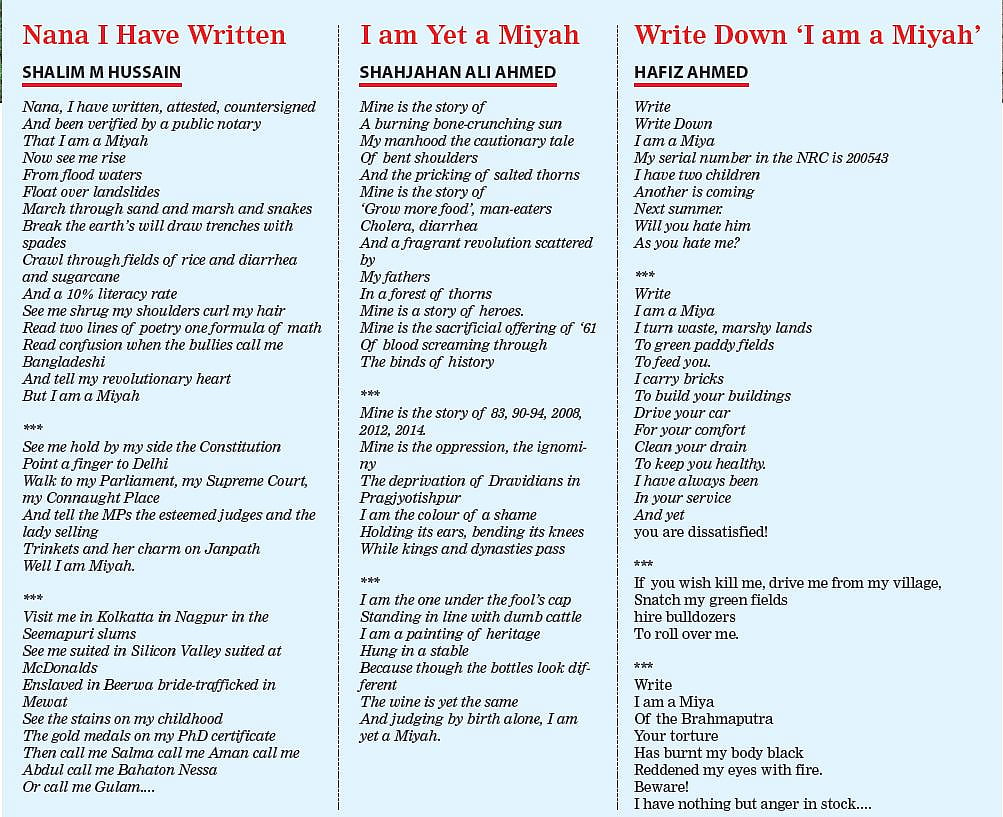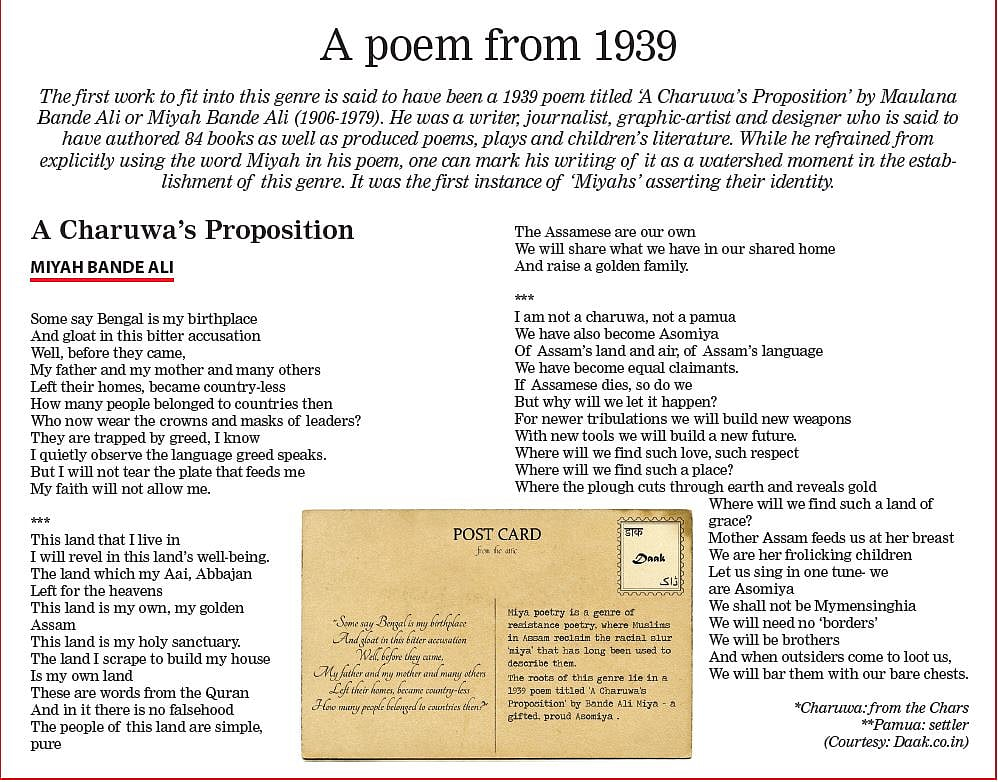Miyah poetry: Poetry of protest in Assam
Amit Shah wants to extend the NRC process to the entire country and deport the ‘termites’. The crisis has revived a genre of protest poetry amongst the state’s Bengali-speaking Muslims

Union Home Minister Amit Shah wants to extend the NRC and deport infiltrators and 'termites'. The identity crisis triggered among Bengali-speaking Muslims in Assam has revived a genre of protest, in the form of poetry
55 linguistic groups
Miyah’ is a matrix within which fall descendants of people who migrated from Tangail, Pabna, Mymensingh, Dhaka and other districts of present-day Bangladesh. However, there is a class angle to the equation too. An educated Bengal-origin Assamese Muslim who also speaks Assamese might be able to camouflage his ‘Miyahness’.
It is curious that Miyah poetry is provoking this extreme reaction; After all, Assam is like a mini-India. There are 55 linguistic communities in Assam, according to the People’s Linguistic Survey of India. The chauvinists have only been keen to wipe out poetry in this one dialect. Why the special antipathy? What is the insecurity about?
Samrat Choudhury, co-editor of Insider/Outsider
Why shift from Assamese ?
Miyah poetry has been written in a dialect prevalent among a region where immigrant Muslims have been residing for seven to 10 decades now. They had up to 1991 declared Assamese as their accepted standard language. They know Assamese well enough. The Assam Movement having deeply scarred them, a section of them had even been persuaded by some leaders from Barak Valley to declare Bengali as their mother tongue, which reignited Assamese suspicions.
Hiren Gohain to Scroll.in.

How long do we suffer ?
They (Assamese) are calling us Bengali-origin Muslims, Bangladeshis, Geda (originally meaning a guy, now used as a derogatory term for Muslim Bengalis) and we have to bear with all these humiliating tags, as well as the detention camps.
How many Assamese are there in the detention camps? You will find that more than 90% people have been detained without any fault, simply because of a mismatch of names, and similar minor errors. You can find only Bengali-speaking Muslims and Hindus in the camps, and because of all this, now we have the Chalo Paltai movement, emerging out of the passion and harassment of Hindu and Bengali Muslims.
These people in the detention camps are mostly from the poor sections of the society, who don’t understand even the ‘L’ of law. They are being harassed only because they speak Bengali, and for nothing else. So, until and unless such illegal harassment of minority community stops, there is no force that can control or stop Chalo Paltai.
We don’t know for whatever reasons our forefathers adopted Assamese identity. Actually, the Bengalis were more affected because of this identity. Only 10 to 15% Assamese people have divided us between Hindus and Muslims for the sake of politics.
Abu Eusuf Mohammad Raihanuddin, one of the admins of the Chalo Paltai Facebook page
Not enough protests
These days a part of the Miyah Mulsims, precisely speaking, a small group of youth, have initiated this programme called Chalo Paltai. As far as I know, already there are debates going on within the Muslim community itself. Many have gone against it; many are smelling a political conspiracy behind it. Well, I saw a video of these people who started this movement. Now, it’s their personal matter how they will identify their culture or their linguistic identity in the coming Census. So, as an outsider, I don’t think I am anyone to comment on it.
They have got personal rights to identify themselves either as Bengali or as Assamese; they have the right to call themselves simply as Miyahs too, apart from being Assamese or Bengalis. Although since 1950, Muslims have been identifying themselves as Assamese, why they should think about altering their identity in the 2021 Census is a serious question. We need to accept without any doubt that even though Muslims comprise a large chunk of the population, today they are facing several types of injustice. Take the example of NRC, where despite having all the correct documents and their names enlisted in the draft list, they have faced massive objections against their enrolment. Isn’t it harassment?
Some people, even though a small group, are covertly involved in harassing these people, but the majority of us have maintained complete silence on these issues. There should have been protests against these harassments, which is not happening.
Har Kumar Goswami, activist

We are Assamese
It is most unfortunate that Miyah poetry and ‘Chalo Paltai’ have been rolled into one. In fact, many of us have taken a stand against Bengali hyper-regionalism in the past. I staunchly believe that there is a conspiracy to frame me as an anti-Assamese. Moreover, among the ten accused in the FIR, there are four researchers who have either completed or are in the process of completing their PhDs on Assamese language and literature. One of the accused is an acclaimed Assamese writer.
We, the Char Chapori Sahitya Parishad have been against Bengali ultra-nationalist movements. The basic thing is that these people have been considering themselves Assamese since 1899 and have assimilated themselves with Assamese language, culture and literature. Now, after more than 100 years, we are considered Assamese. Jyoti Prasad Agarwala called them Nav-Axmoiya (Neo-Assamese) Maimensinghiya.
People of Char-Chapori (sand-bed) areas have given their lives for Assamese language. The way Misings, Tiwas and Karbis are parts of the greater Assamese society, we also are part of it.
Hafiz Ahmed, President, Char Sapori (Sand-bed) Sahitya Parishad
Follow us on: Facebook, Twitter, Google News, Instagram
Join our official telegram channel (@nationalherald) and stay updated with the latest headlines
